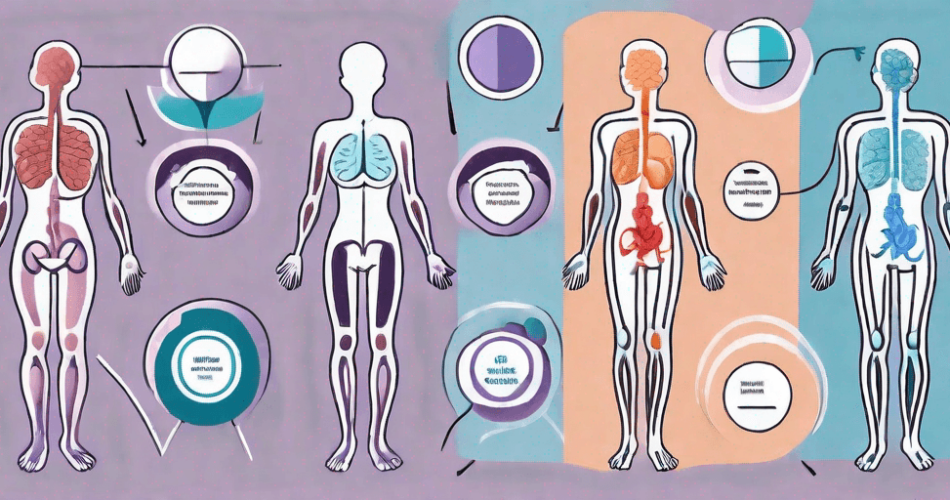Introduction
Irritable Bowel Syndrome (IBS) is a common gastrointestinal (GI) disorder that affects the functioning of the large intestine, causing various symptoms such as abdominal pain, bloating, and changes in bowel habits. This article aims to provide a comprehensive overview of IBS, including its symptoms, causes, and management strategies.
What is Irritable Bowel Syndrome (IBS)?
IBS or spastic colon is a chronic condition that affects the large intestine, also known as the colon. It is characterized by a group of symptoms that can vary from person to person and may include abdominal pain, bloating, gas, diarrhea, and constipation. At the same time, patients with IBS may experience motility or the contraction speed of muscles in the intestines, which provide further impact to the patients. These symptoms can range from mild to severe and may come and go over time.
It is important to note that IBS is not a life-threatening condition and does not increase the risk of developing other serious diseases, such as colon cancer.

Difference of IBS and Colitis
While IBS and colitis might be correlated, there’s still a noticeable difference between them. Their most recognized difference is their causes. Colitis or ulcerative colitis is an inflammatory bowel disease (IBD) like Crohn’s disease due to its nature of chronic inflammation. It happens due to the reaction of the immune system against bacterial infection in the colon. If not treated, it can affect the physical health of one’s colon and the whole body.
Meanwhile IBS is a gastrointestinal illness that can affect the digestive tract, but its effect on the body is not as intense as colitis. IBS patients can experience symptoms and illnesses like acid reflux or gastroesophageal reflux illness.
In that case, it can be safe to conclude that irritable bowel syndrome is less severe than colitis.
Types of IBS
There are 4 types or sub-categories under IBS. These items differ, as each specifies a certain complication involved. Let’s discuss these types of IBS below!
IBS-C
This type of IBS involves chronic constipation. The patient with this type often lacks bowel movement, and during the times that such occurs, there can be instances where the evacuation of the bowel is incomplete. Other times, the patient can also experience strain due to prolonged sitting because of constipation.
IBS-D
Meanwhile, another form of irritable bowel syndrome is IBS-D. When a person has this type, they may have a sensitive colon and show characteristics of diarrhea. Individuals may develop IBS when the diarrhea is ongoing for at least 3 months. Thus, showing irritable bowel syndrome signs.
IBS-M
On the other hand, patients may also experience a mixed type of IBS, which is known as IBS-M. This type can involve alternating experiences of constipation and diarrhea. In short, bowel movement can be inconsistent rather than just being constipated or evacuating loose stool.
IBS-U
Lastly, IBS-U, or irritable bowel syndrome unsubtyped is only diagnosed in patients when their bowel does not fit the first 3 criteria. Other than that, similar symptoms can occur in patients with this condition. That’s why it is important to visit a healthcare facility for a proper IBS diagnosis.
Prevalence of IBS Globally

When it comes to gastrointestinal health, irritable bowel syndrome or IBS is one of the common health risks people can develop. Approximately 5-10% of the worldwide population has this condition, with patients consisting mostly of women rather than men. From bloating and hard stools to chronic diarrhea and rectal bleeding, the different subtypes of IBS present unique challenges for individuals affected by this condition. Thus, showing why it is a prevalent condition that most people have.
Symptoms of Irritable Bowel Syndrome
Aside from the specified symptoms mentioned earlier, there are constant warning signs that patients must recognize. These symptoms can help patients determine their condition and seek help promptly.
For a better understanding of one’s health, we’ve divided the IBS symptoms into 2 categories, physical and psychological. Let’s check their differences below!
Physical Symptoms
Physical symptoms of IBS can be distressing and impact a person’s daily life. Some of the common physical symptoms include:
- Abdominal pain or discomfort: One of the hallmark symptoms of IBS is abdominal pain or discomfort. This pain is often described as crampy and can vary in intensity. It is typically relieved after passing stool.
- Bloating and gas: Excessive gas production in the digestive system can lead to bloating. This uncomfortable sensation can make a person feel full and distended.
- Diarrhea: Some individuals with IBS experience frequent loose stools that may be watery in consistency. This can be accompanied by an urgent need to use the bathroom.
- Constipation: On the other hand, some people with IBS may have difficulty passing stools and experience infrequent bowel movements. This can cause discomfort and a feeling of incomplete evacuation.
- Loose and hard stool: Lastly, patients with diagnosed IBS can have incomplete evacuation soft stool or hard stool. That happens when the texture of the stool is different from your normal bowel, such as loose and hard.
Psychological Symptoms
In addition to the physical symptoms, individuals with IBS may also experience psychological symptoms. The connection between the mind and the gut is well-established, and it is not uncommon for people with IBS to experience psychological distress.
Anxiety: The chronic nature of IBS and the unpredictable nature of its symptoms can lead to anxiety. The fear of experiencing an IBS flare-up or having to urgently find a bathroom can cause significant anxiety in individuals with this condition.
Depression: The impact of IBS on a person’s quality of life can be significant, leading to feelings of sadness and hopelessness. The physical discomfort and the limitations it imposes on daily activities can contribute to the development of depression.
Managing the physical and psychological symptoms of IBS is essential in improving the overall well-being of individuals with this condition. It’s best to seek immediate help from a gastroenterology expert to help address these symptoms.
What Causes Irritable Bowel Syndrome
While the exact cause of IBS is still unknown, several factors are believed to contribute to its development. Discover the contributing factors that lead to the development of IBS below!
Food
One of the common factors that may contribute to IBS occurrence is food. Some individuals have lactose intolerance, which means their digestive system can be compromised after consuming dairy. However, do take note that eating such types of food doesn’t automatically make people develop IBS. Instead, it triggers the known symptoms of IBS.
Medications
Meanwhile, patients who are currently taking medications are also susceptible to IBS, specifically their symptoms. Medications like antibiotics have components that lead to side effects like diarrhea.
Genetics
Another factor to check is the involvement of genes, which is a known factor for passing on diseases. In the case of IBS, patients with parents or relatives who suffer from IBS mean your chances of developing the disease are high. It’s best to take care of one’s health to avoid triggering the IBS symptoms.
Health Conditions
Lastly, patients who are suffering from illnesses involving the digestive tract and gastrointestinal might develop IBS. Bacterial infections in those areas can also trigger IBS symptoms. Thus, leading to either diarrhea or constipation.
Management of Irritable Bowel Syndrome
While there is no cure for IBS, there are various management strategies that can help individuals manage irritable bowel syndrome symptoms effectively and improve their quality of life.
Lifestyle Changes
Making certain lifestyle changes can be beneficial in managing IBS symptoms. This may include incorporating regular exercise, practicing stress management techniques, and dietary changes. Additionally, adequate hydration and getting enough sleep are also important factors in managing IBS.
In terms of the dietary changes, it’s best to consult with the doctor to know the proper nutrition that suits one’s health. That involves consuming foods with probiotics, and other easy-to-digest foods. Thus, allowing patients to regulate their system to help with managing IBS.
Medications for IBS
In some cases, medications may be prescribed to help manage specific symptoms of IBS. These medications may include antispasmodics to reduce abdominal pain and cramping, laxatives to relieve constipation, or anti-diarrheal medications to control diarrhea. However, it is important to consult with a healthcare professional before taking any medications.
Psychological Therapies
Psychological therapies, such as cognitive behavioral therapy (CBT) and gut-directed hypnotherapy, are effective in managing IBS symptoms. These therapies focus on identifying and changing negative thought patterns and behaviors that can contribute to the development and maintenance of IBS symptoms.
Understanding Irritable Bowel Syndrome (IBS) is crucial for individuals seeking fundamental knowledge about this common gastrointestinal disorder. By recognizing the symptoms, understanding the potential causes, and implementing effective management strategies, individuals with IBS can manage their condition and improve their overall quality of life.
Frequently Asked Questions
Can uncured IBS lead to gastroenteritis?
Uncured IBS does not directly lead to gastroenteritis. Irritable Bowel Syndrome (IBS) is a chronic condition affecting the large intestine and does not cause inflammation or infections like gastroenteritis. However, individuals with IBS may be more prone to gastroenteritis due to their existing sensitivities in the gastrointestinal tract. It’s important to manage IBS symptoms effectively and practice good hygiene to reduce the risk of developing gastroenteritis or other related conditions.
Can IBS lead to colorectal colon?
While colorectal cancer is a type of cancer that affects the colon or rectum, it doesn’t mean that there’s a high chance of getting it from IBS. However, individuals with IBS symptoms should consult a healthcare professional for proper evaluation and diagnosis to rule out other potential conditions, including colorectal cancer. Early detection and regular screenings are crucial for preventing and managing colorectal cancer.
Seek Your Doctor’s Help
If you’ve been wrestling with the daily challenges of irritable bowel syndrome, it’s time to break free from its grip and regain control of your life. While we’ve explored the various factors that can contribute to IBS, remember that knowledge alone is not enough. The key to finding relief and managing your symptoms effectively lies in reaching out to a healthcare professional.
Your journey toward better digestive health and a more fulfilling life begins with this decision. So, seize this opportunity, and together with your healthcare provider, you can work towards a future free from the limitations of IBS.
Remember, you don’t have to face it alone; help is just a click away. Your well-being deserves the attention and care it needs. Book a consultation with a gastroenterologist today!



